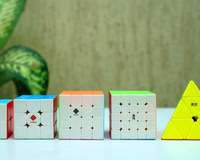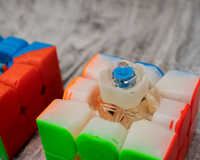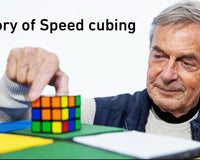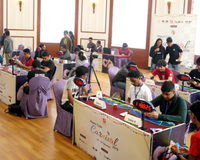Introduction
I first learned to solve a Rubik’s Cube in around 6th grade as it was that time when the cubing craze had struck my class. However, I attended my first competition only in 2016, more than two years later. This blog will be about my competition experiences over close to 6 years and what I have learnt about cubing and the community in that time.
First Competition
My first competition was Monfort Championship 2016, in Trichy. I had no idea about what competitions entailed and I did not perform as well as I expected to. I was very nervous and messed up a lot of my solves, also since I was unfamiliar with the timers and how everything worked. However, it was a great experience. Ron van Bruchem and Chris Hardwick were present along with Bernett Orlando, one of India’s first cubers. I spent most of my time looking around at the venue and the number of people cubing. It was great also to witness at my first competition Vijay Kishore breaking the National Record 3x3 single, which was a point of inspiration.
Motivating Factors
I went to many more competitions after that, at first because I wanted to improve my bad results. Even after many competitions, getting bad times doesn’t go away entirely, and improving my competition scores were a major factor in my continued dedication to cubing. However, another aspect was the community. Once I had become familiar with the environment, I was more comfortable talking to other cubers and I made many friends who I see at competitions regularly. It was a great way to maintain my motivation for cubing, not only so I could improve my personal results, but also to meet other cubers and talk to people who held a common interest.
Practicing Main Events
My main events have changed a lot over time. At first, like everyone else, it was 3x3 I was the most familiar with, and practiced the most. After that, I started branching out because I wanted to participate in all the events most competitions offered. So I began to do One Handed, 4x4, and other puzzles.
Competition results were a major motivation for my practice. I remember my first ever podium being in 3x3 One Handed, so I began to practice that event even more and it became my main event. After that, I got interested in larger puzzles like megaminx and 5x5, so I performed better at those. It was a two-way street: the events I did better at in competitions I practiced more because I was motivated to make them my main events, and the events I did badly in I practiced as well because I wanted to make those results better. Even my current main event, FMC, was something I started practicing after unexpectedly performing decently in competition. I decided to start seriously practicing it on a whim after that, and I luckily ended up setting a National Record a few years later.
Nervousness and Bad Results
Nervousness is something I have experienced at many competitions. When you just get 5 solves and you care a lot about your results, your hands begin to shake and you just can’t turn or look ahead as well as you do at home. It took me a lot of time to get rid of my anxiety, and it still has not entirely gone away. I find that when I participate in events I have practiced a lot and have high expectations for, I usually end up doing poorly.
What has helped is to reduce the pressure on myself. It is important to realize that at home, you do many hundreds of solves, but in competition, you only get 5. So if even two of those solves are on the worse end, the whole average goes for a toss. Not caring too much about the end result and focusing on the solving alone is the best way to go about this, where you don’t set too high expectations. This can only be done by attending a number of competitions to get comfortable with the environment.
What I Have Learned
My experiences at competitions have helped me deal with failure much better. Travelling to a far away venue, then performing poorly and returning home disappointed has been a definite learning experience. Results don’t matter as much as I first thought, though improving personal times at competitions is something that you should strive towards. Familiarity and consistency is the key here. Going to many competitions has made the experience fun and comfortable, which helps in reducing anxiety during solves. The sense of community helps develop sportsmanship, where the competitiveness is present but always friendly and helpful.
Conclusion
Competitions, first and foremost, should be fun. I wouldn’t have attended so many competitions if I did enjoy myself with the community and friends I made, as well as with my official solves. They are a great way to keep cubing motivation going and to meet new people. My competition experiences have been varied: dealing with nerves, occasionally horrible but also amazing solves, and generally having a good time besides learning some important things that have helped me in other areas in my life. You don’t need to be at any particular speed or skill level to sign up, so I would urge you to attend your next nearest competition — it’s fun! And if you feel like you’re not ready, there are always online competitions that can help you prepare, like CSUL run by Cubelelo. Happy Cubing!
About Author

Pranav Prabhu
Pranav Prabhu is the current 3x3 Fewest Moves (Single) National record holder from Chennai. He started cubing when he was 14 and has 5 years of cubing experience. Besides cubing, Pranav enjoys reading books, writing, and playing the piano. He has participated in 36 competitions and won 30 podiums including 8 gold medals and 1 National record.































2 comments
Kummari Sathwik sangvi
No
Abhijeet Ghodgaonkar
Yo Pranav, keep practising!